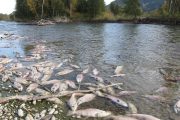
The IPCC has been troubled by a series of scandals in recent years, several of which center directly on its chairman — Rajendra Pachauri — who received (on behalf of the IPCC) the Nobel Prize with former Vice President Al Gore in 2007. In the aftermath of the “Climategate” revelations, which raised fundamental questions about the "scientific" character of the entire theory of manmade global warming, a series of less memorable, but still highly significant, scandals erupted under Pachauri’s leadership at the IPCC.
A debacle that was quickly named “Glaciergate” involved one of the more bizarre examples of the IPCC allegedly playing “fast and loose” with the facts. As reported for The New American in January 2010, “Glaciergate” involved claims in the supposedly-definitive scientific assessment of the Fourth Assessment Report of the IPCC regarding the Himalayan glaciers that were not substantiated by science. Pachauri ultimately had to concede that the claim the glaciers would simply melt away by 2035 was “a regrettable error” and that “the whole paragraph, I mean the entire section is wrong.”
Now a new book by Donna Laframboise — The Delinquent Teenager Who Was Mistaken for the World’s Top Climate Expert — offers a systematic survey of such “regrettable errors” that seem to be standard operating procedure at the IPCC. Among the more regrettable patterns of behavior at the IPCC uncovered by Laframboise is the use of graduate students to write climate reports. As Perry Chiaramonte noted in an article (“U.N. Hires Grad Students to Author Key Climate Report”) for FoxNews.com, Laframboise’s book “claims that its [IPCC’s] reports have often been written by graduate students with little or no experience in their field of study and whose efforts normally might be barely enough to satisfy grad school requirements. Grad students often co-author scientific papers to help with the laborious task of writing. Such papers are rarely the cornerstone for trillions of dollars worth of government climate funding, however — nor do they win Nobel Peace prizes.”
The weak or erroneous science afoot in the IPCC reports has been the subject of much scrutiny among critics of the UN’s involvement in the global-warming debate. Such "science" has been at the heart of plans to fundamentally restructure the entire global economy, and potentially transfer trillions of dollars in wealth from the First World to the Third World. In July of this year, an article for The New American highlighted the potential $76 trillion cost of the UN’s plan for “green technology”:
The UN is engaged in an effort to use the imagined environmental crisis as the justification for a program of sweeping economic redistribution that would shift trillions of dollars from the industrialized nations to the Third World. The UN is now demanding an “investment” of $1.9 trillion per year in “green technology” to meet the goals that the internationalists have set for the nations of the world.…
Now, the $45 trillion has grown to an even more incomprehensible $76 trillion (based on the proposed 40 years of spending $1.9 trillion per year). Calling such a reckless demand “outrageous” and “unsustainable” still falls short — what is demanded is nothing less than the conversion of much of what remains of the economies of the developed world into a means of funneling wealth to the World Bank, which will, ostensibly, redistribute those funds to the Third World.
Now, it would seem that the "science" supposedly supporting such an Earth-shattering inversion of the global economy is the product of graduate students whose academic credentials and practical experience are hardly substantial enough to justify the ends to which their writings would be employed by the United Nations. Chiaramonte highlights several of the “lead authors” for the IPCC who were “barely out of college when tapped to author the final word on the effects of climate change”:
One lead author of the 2001 edition was a trainee at the Munich Reinsurance Company in 2000 and lacked a master's degree while on the panel. He did not earn a Ph.D. until ten years later.
Another lead author in 1994 earned his master's only two years earlier and had his first academic paper published in 1995.
An Australian academic was an assistant author in 2001 and a lead author in 2007 — despite not earning her Ph.D. until 2009.
Dutch geography professor Richard Klein has been a lead author for six IPCC reports and in 1997 became a coordinating lead author. He was promoted to the panel’s most senior role while he was 28 years old — six years prior to completing his PhD.
Laframboise claims in the book that “neither [Klein's] youth nor his thin academic credentials prevented the IPCC from regarding him as one of the world’s top experts.”
In the funhouse mirror of the politics of global warming, scholarly critics of the theory (Henk Tennekes of the Royal Dutch Meteorological Institute, for example) are pilloried, while grad students are the “world’s top experts.” Polls have demonstrated that much of the public has already lost all confidence in the theory of manmade climate change. As more details regarding both the "science" of climate change and the horrific human costs of the solutions for climate change that have been proposed by the United Nations, public faith in any advocate of the theory is likely to plummet.


